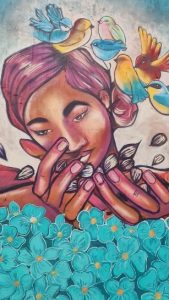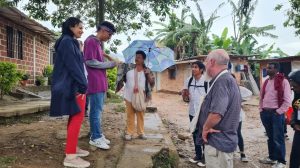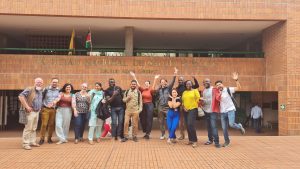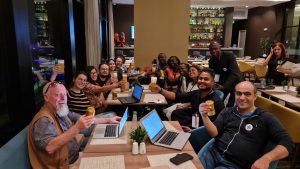In November 2022, I had the opportunity to serve as a facilitator for the Emerging Voices for Global Health face-to-face (F2F) training in Medellin (EV4GH 2022). During the three weeks of high adrenaline and activity at the EV4GH venture and Health Systems Research symposium (Bogotá ), I journaled my observations and reflections from the sessions which took place indoors (big talks, debates, fishbowls), and outdoors (power walk, exploring cities, brainstorming, de-stressing, group discussions), and here are some highlights!
Facilitating EV 2022
My key role at EV4GH was as a facilitator for the F2F phase of the venture. Here, I’d like to reflect on two sessions that were intended to encourage open dialogue among the EVs, a power walk and a peer learning session.
A power/privilege walk is a compelling interactive activity to understand intersectionality and privilege inequalities and inequities. At the EV F2F venture in Medellin, roles for the power walk were assigned randomly among participants to reflect intersecting gender, age, disability status, migration status, and professions. Participants then situated their [assigned] roles within their own country contexts. All participants were asked to stand in a line (facing forward). The “power walk” was that of the participants taking a step forward (or not) depending on their experiences based on a series of “statements” on health, social equity, economic status – each presenting situations which might serve as facilitators or barriers to privileges they held. In the end, participants with the most power and privilege had moved to the forefront, and those with least remained close to the start line. Participants observed how far they reached from the starting line and where they were in reference to other participants surrounding them. Participants then revealed their roles (e.g., a female community health worker, a wheelchair-confined man, a male gay undergraduate in arts) and reflected on their positions – discussing how various intersecting factors contributed to or limited their role’s power. The activity led to discussions and enabled participants to extrapolate the experience to the broader country performance on health and social systems level, e.g., a country with well-developed social welfare schemes enabled a wheelchair-confined man to move further in the power line than one with poorer mechanisms for equity.
A similar power walk was also co-led by me at HSR 2022 in Bogotá to understand power and privilege in global health. This led to an exploration of power imbalances and inequalities in knowledge production and the use of knowledge in HPSR. It enabled participants to understand biases, reflect on power, privilege, and knowledge equity in the global HPSR scenario.
On both occasions, the activity was well received and generated significant information from a large number o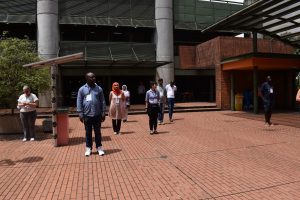 f participants in a short period. The power walk is a great tool to identify focus areas to improve power equity. In case participants do not have lived experiences, they have to depend on stereotypes – which can be a limitation of this exercise. When conducting this activity, it is useful to explain the learning outcomes and prepare participants for the discussion that follows the power walk so that the triggering moments can lead to constructive knowledge.
f participants in a short period. The power walk is a great tool to identify focus areas to improve power equity. In case participants do not have lived experiences, they have to depend on stereotypes – which can be a limitation of this exercise. When conducting this activity, it is useful to explain the learning outcomes and prepare participants for the discussion that follows the power walk so that the triggering moments can lead to constructive knowledge.
The program also conducted a session on peer learning – Rituals & the COVID-19 pandemic – to encourage EVs to reflect on the pandemic and its impact at individual and community levels and on the social phenomena around rituals (social/ cultural/ religious).
The session comprised a short presentation and discussion on rituals, their significance, and how they were impacted and adapted during the pandemic. This was followed by an activity where EVs and facilitators were grouped randomly and discussed rituals (e.g., around adolescence, marriage, death, graduation, etc.) in their contexts. Groups worked with different materials to highlight the individual and communal wounds they might have experienced during the pandemic and then bandaged their “wounds” as a symbol of healing. The session ended with a guided symbolic healing space by closing their eyes, imagining a better world, and stepping forward into it.
This activity was an opportunity to channel emotional experiences into constructive conversations, exposing similarities and differences across EVs’ contexts and build a comradery.
How I will remember EV2022 (and HSR2022)
The EV4GH program offered an opportunity for friendship and support, along with professional skills building on ‘global health’. The sessions reminded us that despite the different contexts we bring as individuals, there are common grounds to build on.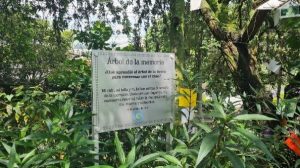
Local site visits are a routine part of the EV4GH program; the local host organized multiple site visits to understand the health systems and social infrastructure of Medellin, one of which was the Cementerio Parroquial de La América, a cemetery for those who died or went missing during the armed conflict in Medellin. The experience was so personal and painful, giving me a glimpse of the impact of conflict and violence around the world in a way in which media coverage on television, social media, or newspaper can never capture.
It would be amiss of me not to mention the two guides I interacted with: Ana (who in her previous avatar was an accountant and later became a tourist guide). She shared historical contexts, personal encounters with health systems, and practices during festivals and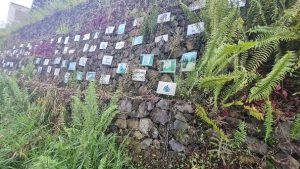 rituals. Adrian (a tour guide in the morning and rapper/ musician at night ) took us around communas (neighbourhoods), patiently explaining the significance of different monuments, graffiti art and translating the emotions of activists. Our young guides’ passionate voices gave us a glimpse of their lived experiences, the raw wounds, and the optimism and responsibility they hold for their country’s future.
rituals. Adrian (a tour guide in the morning and rapper/ musician at night ) took us around communas (neighbourhoods), patiently explaining the significance of different monuments, graffiti art and translating the emotions of activists. Our young guides’ passionate voices gave us a glimpse of their lived experiences, the raw wounds, and the optimism and responsibility they hold for their country’s future.
In Medellin, we commuted by bus daily between our residences and the venue of the training program and vice versa. That took anywhere between 20 to 60 mins, depending on traffic – offering a rich socializing opportunity. At one point, when I was reflecting on my role as a working mother (and whether I am doing justice to the different roles I embody daily), I met Christelle from Benin. Christelle herself is a leader at her organization, doctor, researcher, and mother of two teenagers. She shared her experiences in navigating life when her children were younger: the importance of a support system, being a visible and available parent, and grooming the children in important life skills such that they become responsible and independent. This inspired me to make changes to my parenting style, ensuring I dedicate some quality time daily with my children and identify areas for them to become more independent. Other invaluable conversations about careers, marriage, migration, and caregiving ensued over those bus trips. One such casual conversation with a colleague about his work even gave rise to a rich learning case study on power in global health research, and another led to the organization of a monthly book club.
Although funding is limited and often a cause of concern, facilitating the EV4GH program has been professionally and personally illuminating. I invite EVs to take this step and participate in the network – whether in governance, strategy, or more operational task forces.

